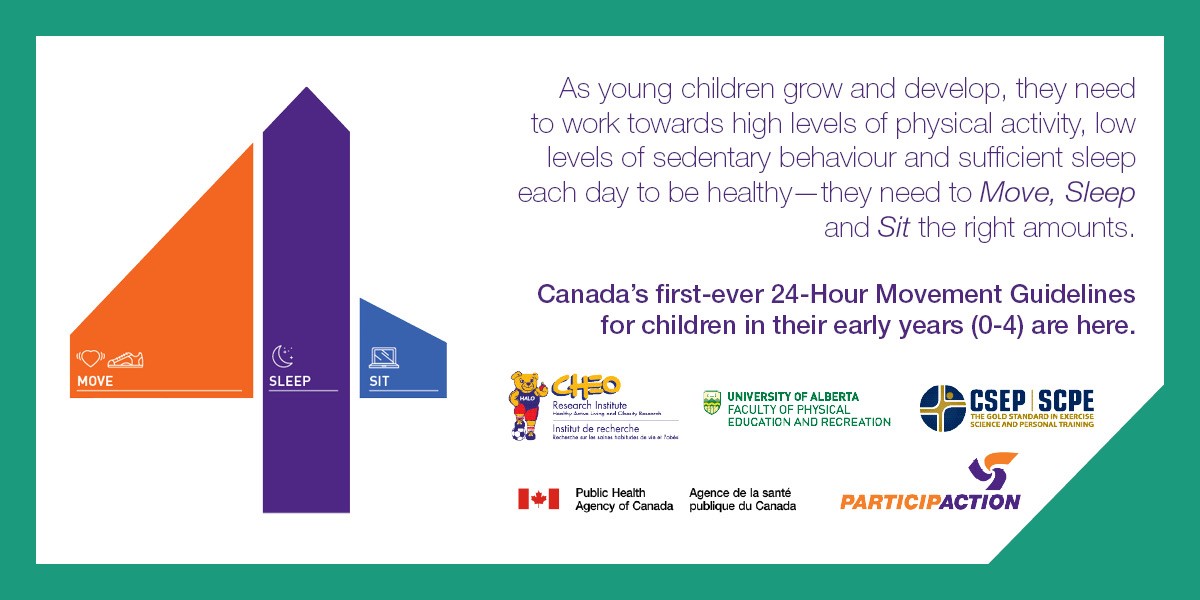Too much screen time prevents young tots from meeting healthy movement guidelines
New guidelines outline the right amounts of moving, sleeping and sitting children aged four and under need for healthy growth and development
Canadian kids aged four and under are spending too much time in front of screens. For example, although it’s recommended that preschoolers have no more than one hour of sedentary screen time per day, 76 per cent of them do. This current reality demonstrates that today’s release of the new evidence-based Canadian 24-Hour Movement Guidelines for the Early Years – one of the world’s first for this age group - couldn’t come at a better time as they help inform how much moving, sleeping and sitting children aged four and under need for healthy growth and development.
The Canadian 24-Hour Movement Guidelines for the Early Years combine physical activity and sedentary behaviour guidelines into one, and include sleep, showing the interrelationship between all three behaviours. These Guidelines were developed by the Canadian Society for Exercise Physiology (CSEP), the Healthy Active Living and Obesity Research Group (HALO) at the CHEO Research Institute, the Faculty of Physical Education and Recreation at the University of Alberta, the Public Health Agency of Canada, ParticipACTION and a group of leading researchers from Canada and around the world, with input from over 600 national and international stakeholders.
“All types of movement matter, and a balance of moving, sleeping and sitting is required for optimal health,” says Dr. Mark Tremblay, Director of HALO. “Even if a child is getting sufficient physical activity in a day, the health benefits can be reduced by too little sleep, or too much sedentary behaviour - especially if that time is spent in front of screens. Following these guidelines through the early years is associated with healthy growth, better learning and thinking, improved motor development, higher fitness level, increased quality of life and reduced injuries.”
Only 13 per cent of preschoolers meet the new Canadian 24-Hour Movement Guidelines, and the time being spent in front of screens is keeping this percentage unacceptably low. Although not all sedentary time is harmful–like reading or storytelling with a caregiver–excessive screen time before age five is as it is linked with language delays, reduced attention and lower school readiness.
“Parents and caregivers must help young children move, sleep and sit the right amounts,” says Elio Antunes, President and CEO of ParticipACTION. “If kids are too tired to get enough physical activity during the day, and not active enough to be tired at night, it can become a vicious cycle. We need to limit screen time and encourage children to participate in a range of enjoyable and safe play-based and organized physical activities in a variety of spaces, places and seasons, in all types of weather.”
According to the new guidelines, a healthy 24 hours includes:
- For infants (under 1 year old):
MOVE: Being physically active several times in a variety of ways, particularly through interactive floor-based play, but more is better. For those not yet mobile, this includes at least 30 minutes of tummy time spread throughout the day while awake.
SLEEP: 14-17 hours (for those aged 0-3 months) or 12-16 hours (for those aged 4-11 months) of good-quality sleep, including naps.
SIT: Not being restrained for more than one hour at a time (e.g. in a high chair). When sedentary, engaging in pursuits such as reading and storytelling with a caregiver is encouraged. Screen time is not recommended.
- For toddlers (1-2 years old) and preschoolers (3-4 years old):
MOVE: At least 180 minutes spent in a variety of physical activities at any intensity spread throughout the day, but more is better. Include energetic play for both age groups, with preschoolers getting at least 60 minutes of it.
SLEEP: 11-14 hours of good-quality sleep for toddlers, and 10-13 for preschoolers, which may include naps, with consistent bedtimes and wake-up times.
SIT: Not being restrained for more than one hour at a time (e.g. in a stroller) or sitting for extended periods. When sedentary, engaging in pursuits such as reading and storytelling with a caregiver is encouraged. Sedentary screen time for those younger than two years old is not recommended, and no more than one hour for those aged 2-4, but less is better.
To download a copy of the complete Canadian 24-Hour Movement Guidelines for the Early Years please visit www.csep.ca/guidelines and participACTION.com.
“For young children to be their healthiest, they need the right amount of sleep and physical activity during their day,” said the Honourable Ginette Petitpas Taylor, Minister of Health. “Healthy habits in childhood lead to good health throughout life. These new Canadian 24-Hour Movement Guidelines for the Early Years are an important tool to help parents and healthcare professionals support healthy growth and development for Canadian children.”
Here are some tips to help parents and caregivers get the most out of the 24-Hour Movement Guidelines:
- For infants, supervised activities could include tummy time, reaching and grasping, pushing and pulling, and crawling
- For toddlers, energetic play could include running or dancing, playing outside and exploring the environment
- The older children get, the more energetic play they need, such as hopping, jumping, skipping, swimming and bike riding
- For quiet activities, try storytelling, crafts, puzzles or reading, not screens. Even if shows are educational, kids don’t take in information from screens the same way as they do when interacting with a caring adult
- Develop healthy “sleep hygiene” by having a calming bedtime routine, consistent bedtimes and wake-up times, even on weekends and avoid screen time before sleep
“Restoring physical activity as the norm rather than the exception supports an integrated approach to healthy living and chronic disease prevention,” says Chief Public Health Officer, Dr. Theresa Tam. “Our work with CSEP, ParticipACTION and other partners, including the development of these Guidelines, continues to make Canada a leader in healthy living."

